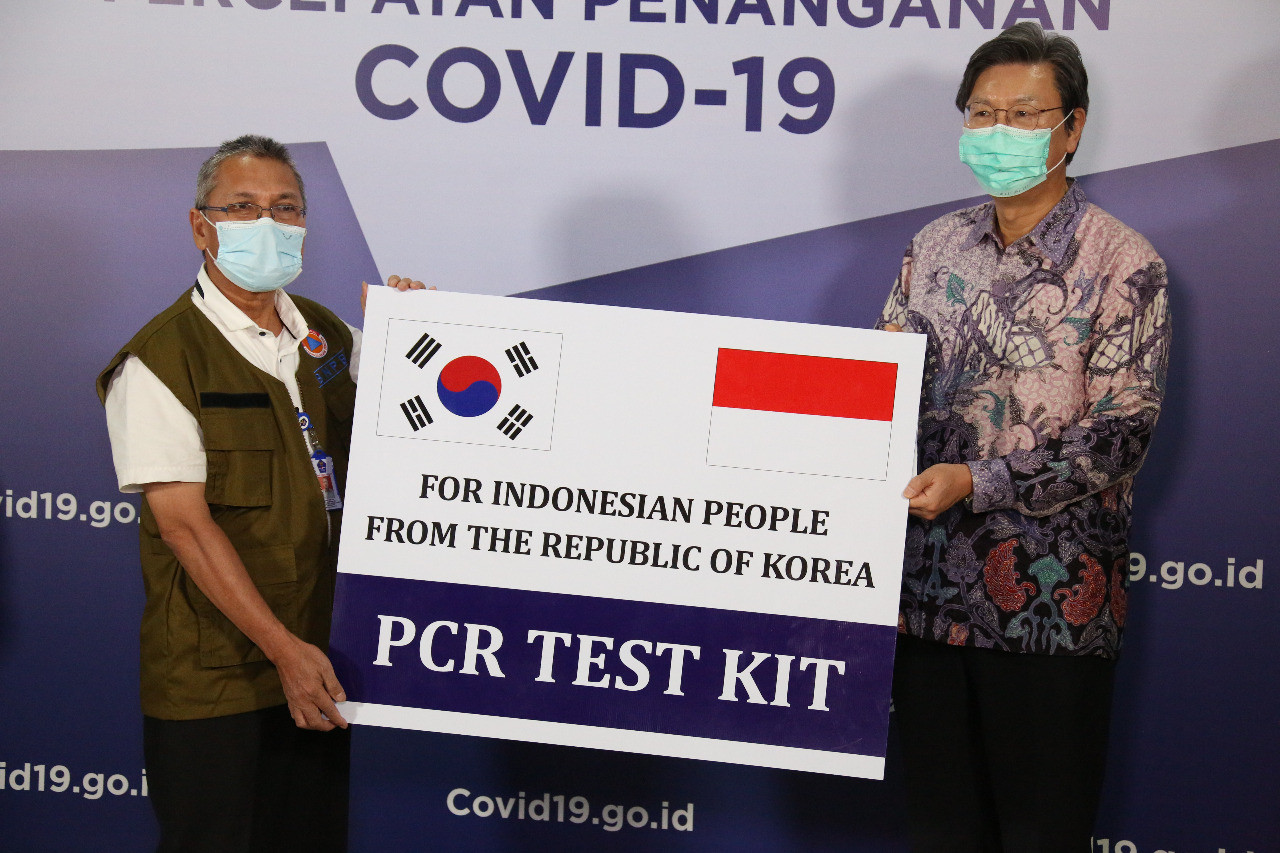Popular Reads
Top Results
Can't find what you're looking for?
View all search resultsPopular Reads
Top Results
Can't find what you're looking for?
View all search resultsIndonesia, South Korea join hands in COVID-19 response
Change text size
Gift Premium Articles
to Anyone
 South Korean Ambassador to Indonesia Kim Chang-Beom (right) hands over the donation of polymerase chain reaction (PCR) test kits to National Disaster Mitigation Agency (BNPB) logistics director Ibnu Asur at the BNPB headquarters in Jakarta on April 24, 2020. The South Korean government has pledged to donate US$500,000 worth of test kits and disinfectant sprayers to help Indonesia combat the COVID-19 outbreak. (Courtesy of/National Disaster Mitigation Agency (BNPB))
South Korean Ambassador to Indonesia Kim Chang-Beom (right) hands over the donation of polymerase chain reaction (PCR) test kits to National Disaster Mitigation Agency (BNPB) logistics director Ibnu Asur at the BNPB headquarters in Jakarta on April 24, 2020. The South Korean government has pledged to donate US$500,000 worth of test kits and disinfectant sprayers to help Indonesia combat the COVID-19 outbreak. (Courtesy of/National Disaster Mitigation Agency (BNPB))
I
ndonesia looks to learn more from South Korea in raising its capacity to curb viral infections, officials have said, as the special strategic partners work together in the multilateral response to the COVID-19 pandemic.
Having recorded some of the highest transmission rates in all of Southeast Asia, Indonesia has struggled to “flatten the curve” of infection due to its limited testing capacity and slapdash policy decisions.
Indonesian Ambassador to South Korea Umar Hadi said the Korean Center for Disease Control and Prevention (KCDC) and other related institutions could help Indonesian authorities respond better to the viral outbreak.
Between the two countries, the COVID-19 outbreak began much earlier in South Korea, near the end of January, whereas Indonesia only reported its first confirmed case in early March.
At the time, there were so many unknown factors to the disease, but now Indonesia stands to benefit from the wealth of data available to determine the direction of its COVID-19 response.
“[It] would practically make the unknown that little bit more familiar, and researchers could shed more light on what works and what doesn’t or what policies could be pursued,” Umar said during a virtual discussion hosted by the Centre for Strategic and International Studies (CSIS), on Wednesday.
South Korea endured one of the worst early outbreaks of the disease outside China, and while it never imposed a compulsory lockdown, strict social distancing had been widely observed since March.
Now the South appears to have brought its outbreak under control thanks to an extensive "trace, test and treat" program that has drawn widespread praise, AFP reports.
In a population of 51 million, its death toll is little more than 250, and new cases have slowed to just a handful – 13 in the past three days, all of them arriving international passengers.
At its peak, the country reported 909 cases in late February, Yonhap news agency reported.
In contrast, since President Joko “Jokowi” Widodo announced the first confirmed cases, Indonesia has recorded 12,776 infections and 930 deaths, according to Thursday’s official tally.
“I think Indonesia can learn from this valuable data,” Umar said.
“We need a kind of more structured, institutionalized communication or sharing between the KCDC and maybe the BNPB [National Disaster Mitigation Agency] or the Health Ministry in Indonesia so we can also benefit from the data collected in [South] Korea.”
CSIS executive director Philips J. Vermonte pointed out that the pandemic had exposed vulnerabilities in various aspects of governance in Indonesia, especially its decision making and institutional capacity.
Unlike South Korea, which had taken swift action against the outbreak, Philips said Indonesia had been very slow to respond in the beginning, and then proceeded with a half-hearted policy.
The government took almost two weeks after its first COVID-19 case to set up a rapid response team, and the large-scale social restrictions (PSBB) were only introduced by the end of March, at a time when more than 1,500 people were already infected by the coronavirus.
Since the onset of the pandemic, Indonesia and South Korea have joined hands to cooperate on mitigating the health crisis.
In late March, South Korea put Indonesia on its priority list for quarantine supplies exports, which includes test kits.
The government in Seoul recently pledged to provide a US$500,000 grant to Indonesia in the form of test kits and rechargeable power sprayers for sanitation.
Previously, the head of the national COVID-19 task force, Doni Monardo, said Indonesia exported ready-to-use personal protective equipment (PPE) to South Korea as compensation for procuring raw materials from the South to meet domestic needs.
The Foreign Ministry’s director general for Asia, Pacific and African affairs, Desra Percaya, noted that the two countries just concluded negotiations on the Indonesia-South Korea Comprehensive Economic Partnership Agreement (IK-CEPA), but said that, “in order for this to work, we should first address, adapt and adjust to the ‘new normal’ by working hand in hand to revive international trade as an engine for growth”.
The two countries concluded the negotiations in November last year and look to sign the CEPA by the first half of 2020.
South Korean Ambassador to Indonesia Kim Chang-beom hailed the cooperation, saying the two countries have worked well when compared to partnerships with other countries.
“President Moon [Jae-in] and President Jokowi spoke the same language when they attended the G20 special virtual summit in April,” he said during the discussion on Wednesday.
“And then our foreign ministers Ibu Retno [Marsudi] and Minister Kang [Kyung-hwa] have led efforts to tackle COVID-19 through global collaboration and coordinated responses at various forums.”









